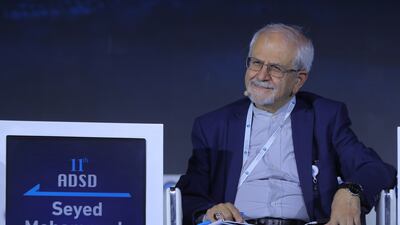Economic interdependence will breed regional security between Iran and its neighbours, an adviser to Iran's Foreign Ministry said at foreign policy forum in Abu Dhabi on Tuesday.
“Very significant steps are being seen in the region” towards improving ties between Iran and Arab states, Seyyed Mohammad-Kazem Sajjadpour said, a day after Saudi Arabia condemned Israel's recent attacks on Iran at an Arab-Islamic summit in Riyadh.
Speaking at the 11th Abu Dhabi Strategic Debate, Mr Sajjadpour pointed to Iran's relations with Iraq, with which it signed several trade agreements following President Masoud Pezeshkian's visit to Baghdad in September.
“One of the major themes of his trip was economic co-operation and it’s not just Iraq, with other neighbours too – and it’s working because it’s mutually beneficial for bilateral ties,” he said. “When you create economic interdependence the byproduct will be security and stability.”
Regional stability has become a major concern since Israel launched a devastating military offensive in Gaza last year following the deadly October 7 attack on southern Israel led by Palestinian militant group Hamas. The war spread to Lebanon in September after a year of cross-border fire between the Israeli military and Lebanese armed group Hezbollah.
Israel and Iran have exchanged two rounds of tit-for-tat attacks in April and October this year, triggered by Israel's assassinations of top figures from Hamas and Hezbollah, both of which are backed by Iran, and of senior Iranian military figures in Syria.
Mohammad Reza Dehshiri, dean of the School of International Relations run by Iran's Ministry of Foreign Affairs, said Saudi Arabia's condemnation of Israel's attacks on Iran “demonstrates the will and determination of a peaceful co-existence in the region”.
Speaking to The National on the sidelines of the two-day conference, Mr Sajjadpour said the visit by Saudi Arabia's army chief of staff to Tehran on Sunday, where he met his counterpart to discuss defence ties, was an “important step” not only for better bilateral ties but for regional peace and security as a whole.
“Neighbourhood policy is the motto of Iran’s foreign policy,” Mr Dehshiri said. Iran “would like to co-operate with all the countries in the region”, he added. This requires “confidence-building measures, co-operation and communication”.

Iran recently invited Saudi Arabia to be part of joint naval exercises in the Red Sea. “These joint manoeuvres can be extended to other countries of the region and we can work together for a better and prosperous region where peace, security and stability would be a major factor,” Mr Dehshiri said.
He said Mr Pezeshkian's predecessors had paved the way for the closer ties being seen between Iran and its neighbours following decades of isolation. “Now, the countries of the region have understood that Iran is sincere in its confidence-building measures.”
Non-state actors
On the opening day of the conference, Dr Anwar Gargash, diplomatic adviser to President Sheikh Mohamed, said that national institutions in the region must be supported and that non-state actors “must not be tolerated”.
Iran supports Hamas in Gaza and Hezbollah in Lebanon, but Mr Dehshiri maintained that Iran does not “give orders” to these groups, which act of “their own will” against Israel.
“I think rather than focusing this issue on the axis of resistance, we should rather say that the era of Israeli genocide, or occupation is over,” he said, referring to the informal alliance of Iran-linked forces in the region.
“It is a subsidiary issue,” he added, identifying Israel as an occupying force as the main source of instability in the region.
Mr Dehshiri also said that Arab states should put pressure on Israel, rather than non-state actors, through reducing their diplomatic ties, cutting off trade with the country and pressing the US administration to stop sending arms to Israel.


